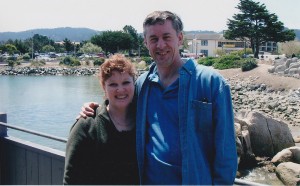by Bruce Wilcox
(Editor’s Note: Many of you will remember that Bruce has been getting ready to serve among us full time as we prepare for the retirement of Dave and Linda Webber. Bruce and his wife Jackie have recently stepped into this new adventure and we have been blesse d to have them.)
d to have them.)
The Bible talks about the critical importance of essential and sound doctrine, and I’m sure we all agree with that. Many of us are aware that Biblical illiteracy is also definitely a concern these days. But is there something else . . . something beyond that nice tidy exegetical line that we feel comfortable with, and sure about in our interpretations and understanding of Scripture?
Paul prays that Christians would be able to “know the love of Christ which passes knowledge.” (Eph 3:19, NKJV). Now, is this a contradiction? An oxymoron? How can we “know” something which actually “passes knowledge”? Or know that which is beyond knowing?
It seems that Paul is saying (and praying) something to the effect that our relationship and our dealings with God must go beyond merely our intellectual and rational processing of Biblical doctrines about Him. It must go beyond trying to confine God into any nice tidy systematic theology. It involves a knowing of His love, and therefore a knowing of Him personally. That can only be produced in us and increased in us by the Holy Spirit because it’s His love: “the love of God (that) has been poured out in our hearts by the Holy Spirit” (Rom. 5:5).
This is of course totally supernatural. And the very definition of eternal life itself that Jesus gave is that we “know You, the only true God, and Jesus Christ whom You have sent” (John 17:3). But how we experience Him and know Him and His love is probably as different for each of us as is our own created uniqueness in the first place. So objective truths about God in His written Word were never meant to be an end in themselves. They were intended to result in a personal knowing of Him, the “Living Word.” That is actually subjective in the sense that we are all at different places on this journey. If a family hears exactly the same story together, even though they all experience the hearing of it accurately, the five year old, the teenager, and the parents in that family are going to understand and respond to it quite differently, yet still appropriately.
Eugene Petersen reminds us of something important that I for one have needed to hear. Petersen has a glittering academic resume and intellectual gifts, and should therefore know what he’s talking about when he says that an academic “students-getting- ready-for-an-exam” approach to the Scriptures is a “poverty-stricken” approach. He warns that we are so easily tempted to “use” and “apply” Scripture (in sometimes manipulative ways), rather than just humbly coming before it in a listening/responding way, where we seek to just prayerfully submit to it. As Petersen aptly says in his book Living the Message, we need to “let the Word use us, rather than using the Word.” In other words, to follow the same approach we want to have in our relationship with the “Living Word”, Christ Himself.
But could it be that here in the West especially, our whole educational system has geared many to assume that the “academic” approach is all we really need – even with Scripture? Are we to be content with just an intellectual Christianity? Where we read the text only to analyze and extract information in order to “win” theological arguments, and end up with sometimes even more unnecessary divisions in the Body of Christ?
Isn’t it interesting that in China in 1949 there were about one million Christians, and by about 1952 the communists had eliminated all foreign influence there? No missionaries, no seminaries, no Bible colleges, and not even many Bibles. Many Christians in the West were concerned, “What’s going to happen to persecuted Christianity in China?” About forty or so years later China began opening up again, and the world discovers there are now 80 to 100 million Christians there, and the fastest growing church in the world! Ironically, during the same period Christianity in the West has declined rapidly. Why? Perhaps because they came to “know” more of that which we all need more of; that which “passes knowledge.”
I just want to say in closing how blessed we have been in experiencing the love and fellowship of Christ in so many ways through getting to know more of our family in Christ better in all the southern house churches during Dave’s absence. We have seen your love and care for one another, and others in the reaching out and inviting neighbours and people around your respective areas in His love. We sometimes see new folks as a result. What a blessing to worship the Lord with you all. And thank you for your really encouraging love, prayers and support for Jackie and me! Bunches of blessings to all.
